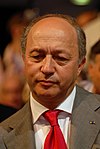French Socialist Party presidential primary, 2006
|
|
|||||||||||||||||||||
|---|---|---|---|---|---|---|---|---|---|---|---|---|---|---|---|---|---|---|---|---|---|
|
|||||||||||||||||||||
|
|||||||||||||||||||||
|
|||||||||||||||||||||
The Socialist Party presidential primary of 2006 was the selection process by which members of the Socialist Party of France chose their candidate for the 2007 French presidential election. In a nationwide vote on 16 November 2006, members of the party chose Ségolène Royal over Dominique Strauss-Kahn and Laurent Fabius, making Royal the first female nominee of a major party for the office of President of France.
At the 2005 Socialist Party congress in Le Mans, Dominique Strauss-Kahn and Laurent Fabius had both been considered top contenders for the next year's nomination. Strauss-Kahn, a wealthy and high-profile economist, was derided by many Socialists as a Blairite, but he still possessed a lengthy record of consequence which guaranteed him a place on the primary's shortlist. Fabius, the more traditional Socialist of the two, had seemed particularly ascendant after the distinct leftward tilt of the Le Mans congress and its resultant party platform.
The November primary had a registration date of 1 October 2006. From early in the year, speculation grew about other candidacies including those of the former Minister of Culture Jack Lang, the former Minister of Health Bernard Kouchner, and even Lionel Jospin, the Socialists' previous nominee for President in the 2002 national election. Jospin was nominally in retirement after his disastrous loss, but he was still considered a potential entrant in the primary. When he formally announced on 28 September that he would not register for the primary, he left open the option of supporting any of the other candidates except one – Ségolène Royal.
...
Wikipedia



